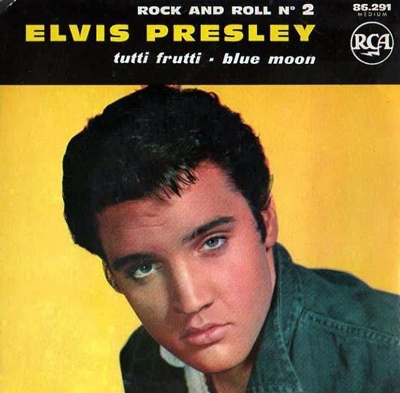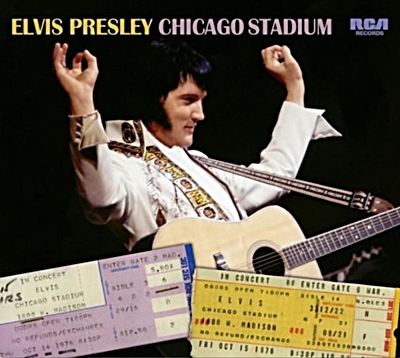'Reconsider Baby: Elvis Presley: A Listener's Guide'
By author Shane Brown
Book Review by Piers Beagley
|
Elvis Presley made over 700 recordings during his life. This book examines all of them. Session by session, song by song, Reconsider Baby takes the reader on a journey from Elvis’s first recordings in 1953 through to his last performances in 1977.
This significantly expanded and revised edition of 2014’s Elvis Presley: A Listener’s Guide provides a commentary on Elvis’s vast and varied body of work, while also examining in detail how Elvis and his recordings and performances were discussed in newspapers, magazines, and trade publications from the 1950s through to the 1970s.
The text draws on over 500 contemporary articles and reviews, telling for the first time the story of how Elvis and his career played out in the printed media, and often forcing us to question our understanding of how Elvis’s work was received at the time of release.
Kindle and also 447 page paperback.
EIN's Piers Beagley reviews the newly expanded look into Elvis' musical legacy...
|
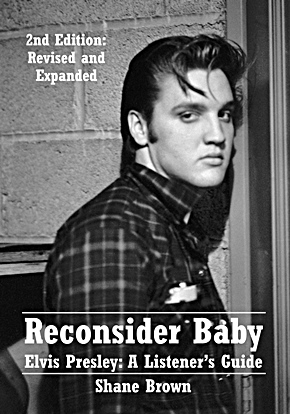 |
| Disclaimer: I have to note that while I am thanked in the book's Acknowledgements for being “remarkably encouraging” in all honesty I only supplied enthusiasm to the author in his idea to put more time into expanding his first volume. The first time I read this new volume was when I purchased it from Amazon. |
Elvis Presley’s music is without doubt the most important aspect of his amazing career - so it is surprising that so few books have been published that examine his musical legacy in any detail. Ernst Jorgensen's ‘A Life In Music’, Paul Simpson’s ‘The Rough Guide to Elvis’ along with Mike Eder’s ‘Elvis Music FAQ’ are the only books that readily spring to mind.
In comparison the number of Elvis biographies published is astounding and most of them hardly touch on what made Elvis so important in the first place - his musical creativity.
In his newly expanded 'Reconsider Baby: Elvis Presley: A Listener’s Guide' Shane Brown not only examines every recording in Elvis’ astounding RCA legacy but also discusses important FTD fan-club releases and how RCA / Col Parker could have handled Elvis’ releases in a much better fashion. The book is a wonderful expanded update on his original 2014 publication.
Shane Brown’s text is both informative and interesting with a nice touch of English humour that helps keep it light and entertaining.
The book's Introduction nicely explains... "This book is a re-evaluation of Elvis’s musical legacy which benefits from being written four decades after he made his final, sad recordings. All important artists have had their works re-evaluated over time. Film director Alfred Hitchcock is a key example .... Without looking again at artistic works of the past, we would not learn to appreciate them.
... I want to look at this music without the prejudices of the past, and discuss each song on its own individual merits, whether an original rocker from the 1950s or a 1970s cover of a song by Perry Como. This book will not judge a performance on its genre, but on its quality. Hopefully, this will open up a new discussion on Elvis’s musical legacy in which the traditional views can be challenged. It’s about time.
... My aim here is not to persuade anyone to agree with me. In fact, part of the fun of reading a book like this is vehemently not agreeing with the author – and if my comments produce a strong reaction, then that is not necessarily a bad thing."
All of Elvis’ major creative achievements are thoroughly discussed and it was a surprise to me how many nuggets of “new” information I learnt even though I have examined these essential recording sessions so many times before.
After a while I felt that reading Shane’s book was like having a fascinating discussion with a good friend about Elvis’ music. While you might not always agree with his personal opinion about every track he provides so much extra information – over 500 excerpts from contemporary articles! – that it is always a thought-provoking debate.
I regularly stopped reading just to spin the original recordings to see how his discussions held-up - which is surely a sign of a stimulating read. Fans should note that the book is purely text with no images.
I was always disappointed that Ernst Jorgensen's ‘Elvis: A Life In Music’ pretty-well ignored Elvis mid-sixties soundtrack albums even though they sold extremely well, so it is a real positive that Shane examines the pros and cons of this period - as he does with all of Elvis’ career.
The book is wonderfully expanded on his first volume and the addition of so many contemporary articles make the discussion so much more interesting.
Shane Brown also challenges and examines some often-repeated myths which makes for good reading and he even corrects some of Ernst Jorgensen's assumptions.
Looking at little more in-depth into the book and featuring a few excerpts..
This image is for the EIN review, there are no images in the book.
The Fifties
As an example Shane truly captures the beauty and fascination of ‘Blue Moon’ recorded at SUN ..
"Sam Phillips didn’t release Elvis’s Blue Moon at the time of recording (it would eventually be released in 1956) and yet it remains one of his most remarkable performances. Elvis slows the song right down, but only sings the first two verses – the bridge and the final verse were not recorded. Scotty Moore and Bill Black create a sparse, eerie, clip-clopping country-style background as Elvis sings close to the microphone with his voice completely surrounded in echo. In between each verse, he vocalizes with a strong and yet ghostly falsetto that is enough to send shivers down the spine, and yet which he hardly ever used again during the rest of his recording career. Herm Schoenfeld wrote in Variety in 1956 that “an echo effect and some falsetto piping almost succeeds in making the song unrecognisable.” Two decades after the release, Greil Marcus said that Elvis “sings like a swamp-spirit, making his way through the fog to that lamp post that Frank Sinatra used to cart out for all his album covers. Whining and waiting between the lyrics – which, as Elvis sings them, sound quite surreal – he turns this old standard into a combination of supper club ballad and Appalachian moan.”
I felt that Shane’s previous volume somewhat over-looked some of Elvis’ important live 1950’s recorded concerts - possibly due to poor audio quality (see interview with the author here) so it is excellent to see them fully discussed in this new book. Readers will discover a wealth of new information and I particularly enjoyed the expanded look at how angrily some journalists reacted about Elvis’ incredible teenage impact.
… It wasn’t just critics and writers attacking Elvis in the second half of 1956. The chairman of the music department of Bryant High School told the St. Petersburg Times that Elvis on The Milton Berle Show presented: "…a demonstration which was in execrable taste, bordering on obscenity. The gyrations of this young man were such an assault on the senses as to repel even the most tolerant observer… We in the classroom can do very little to offset the force and impact of these displays in our efforts to stem the tide toward a cultural advance."
The attacks didn’t just come from America. In the UK (where the TV performances had not even been seen), Picturegoer magazine were also rather blunt with their thoughts on Elvis:
"The news that he is coming to England early next year fills me with advance revulsion. If the Musicians’ Union could prevent his working here, it would suit me fine. …I know that this man is dangerous and don’t want to see British youngsters hacking out his name on their arms with clasp-knives or see sex treated as an appallingly commercial freak-show."
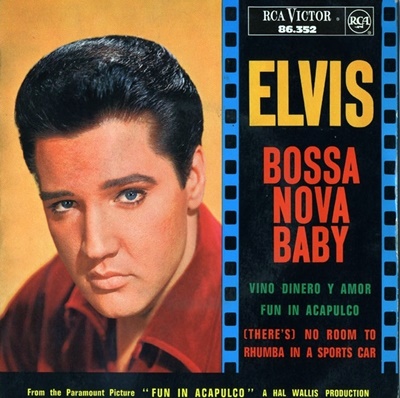 |
The Sixties
He writes of one of Elvis’ best songs..
.. Elvis’s recording of Little Sister retains some of the edgier sound that is so in evidence on the tape of the March concert. Hank Garland’s guitar work gives the song a tough feel that, in many ways, pre-dates the sound that would hit America a few years later with the so-called “British Invasion.” If Elvis had continued in this vein, with the harder sound and the snarling vocals, he may well have had a chance at staying current and relevant throughout the 1960s.
He also challenges thoughts about one of Elvis' worst songs!
.. The final song, 'No Room to Rhumba in a Sports Car', has come in for some flack over the years, being highlighted as an example of everything that was wrong about Elvis’s years in Hollywood. In reality, the song is completely daft, but at least that was the intention. For a jokey novelty song about the Latin-American craze, it’s probably as good as can be expected. As for Elvis, singing about how a “pretzel feels” might not be his finest moment, but he seems to take it with good humour. The next time he encountered a pretzel in song would be in the infamous Yoga is as Yoga Does sequence of Easy Come, Easy Go – and the less said about that, the better.
Shane's debate about why the media interest in Elvis' creative side actually increased before the "Comeback Special" adds a new twist to the often-repeated story..
... (Journalist) Vernon Scott didn’t just write one article on Elvis in the summer of 1968, but three. What is clear is that he found Elvis at a crossroads in his life, and that he had changed over the years, becoming more comfortable in his own skin. When he met Elvis on the set of Charro, he found “an entirely different Elvis from the slick, black-haired youth of the past, strikingly dressed and poutingly pretty. The self-conscious slouch was gone too.”
It is all fascinating stuff.
The Seventies
Elvis’ 70’s legacy could have been handled in a far better way by RCA / Parker had they not been so damn greedy and it is enjoyable how Shane presents his discussion on this aspect of Elvis’ work and doesn’t shy away from saying which tracks should have stayed in the vaults.
Shane writes of the 'On Stage' Las Vegas period..
... The big question is why it should matter that Elvis’s style and tastes were changing. He may have only been thirty-five, but he had been in the business for sixteen years and, no matter what he did, he was unlikely to ever regain the following of the majority of teenagers, although they may well buy a single if it appealed. Besides, he’d changed his style before – and yet the perfect-but-bland recordings from 1962 and 1963, for example, are still not viewed with as much derision by many as Elvis’s choice of material and style of performing in the 1970s. The style of vocal performance is, as we shall see, more problematic as the years progressed, mostly due to Elvis’s health, but could it have come as that much of a shock to Elvis’s real fans that he was turning more towards easy listening, country, and MOR material? For the whole of the 1960s, rock ‘n’ roll had not been the focus of his repertoire. At least now he was singing contemporary adult music rather than songs about yoga or “goop” or impotent bulls. Not all critics viewed Elvis’s change in direction with derision. Jack Lloyd wrote that “Elvis concentrates on newer material – new in his repertoire, at least. And he makes it sound just fine… Elvis doesn’t revert back to his roots completely… but he comes closer to those roots than he has in years, and it’s evident that he responds, turns on, to the emotional sparks of a live audience.”
Some important FTD releases are also commented on and while I'll let you discover what Shane thinks of Elvis' final Jungle Room sessions he doesn't ignore the later live performances of 1976 and 1977..
The final tours of 1976 were, for the most part, an improvement on what Elvis had been delivering in concert during the previous six months. The 'Chicago Stadium' FTD release, containing the concerts from October 14th and 15th finds Elvis slimmer, sounding somewhat rejuvenated, and giving more controlled, careful vocals than earlier in the year. In late December, another short tour would also find Elvis in good form, culminating in the famous New Year’s Eve show in Pittsburgh that was, to all intents and purposes, Elvis’s last great show. In between the October and December tours were rather more routine efforts both on the road and in Las Vegas, with Elvis betraying signs of being bored and tired with the latter. One thing that stands out during the reviews of these shows (and those during the first months of 1977) is the way critics talk about Elvis’s age. Elvis was only in his early forties, and yet he is talked about as if he is much older. “If Elvis is 41 years old, his voice doesn’t reflect it,” wrote Pat O’Driscoll in the Nevada State Journal. Another writer asks if you can be “sexy at 42 with a weight problem.”
Elvis is being talked about as if he is in his sixties rather than his forties. Perhaps this is, at least in part, because he had been in the public eye for such a long time, or maybe the reporting of health problems for the last four years had contributed to this somewhat twisted view of his age and what should be expected from him.
As a fine conclusion to the book Shane Brown lists his “Elvis Top 100” which is a fascinating read.
He provides a short review of Elvis’ key 100 releases and rates them all. This is a lovely way to end the book as you can compare your scores with his! The book is right up-to-date with the 2017 ‘A Boy From Tupelo’ included as the 100th key release – and no spoiler here rightly getting 10/10.
But (IMHO) c’mon, ‘Harum Scarum’ surely should get more points for sheer strangeness and weird Middle-East influence than the boring ‘Kissin’ Cousins’!
Overall Verdict: There is so much to read and enjoy and debate, that even though I have read so much about Elvis' music this book got me going back to Elvis' classic tracks to give them a close listen once again. Reconsider Baby is not only a fascinating read but also works as a reference book when you need it. For instance I dipped back in to Shane Brown’s discussions of Elvis’ original sessions when listening to the new overdubbed RPO Christmas release.
The book nicely works for a well-informed fan as well as a “new” Elvis listener - in that Elvis’ key sessions are well-represented and ‘Elvis’ ‘Top 100’ is an excellent buyer’s guide. The many newly found newspaper articles will be a real discovery to old fans as well as "uneducated" new fans in helping explain why Elvis’ impact was SO astounding at the time. Any book that makes you want to revisit Elvis’ astounding musical legacy is surely a great addition to anybody's library - Highly recommended.
- EIN note the images used in this review are NOT from the book.
For more about this book please see EIN's interview with author Shane Brown.
Review by Piers Beagley.
-Copyright EIN October 2017
EIN Website content © Copyright the Elvis Information Network.
Click here to comment on this review
|
|
|
You can easily purchase Shane Brown's book "Reconsider Baby: Elvis: A Listener's Guide" on Kindle or even better as a 447-page large-size paperback book through Amazon - see the purchase links |
"Reconsider Baby: Elvis: A Listener's Guide" 2017- Shane Brown Interview : Since Elvis's Since Elvis' death in 1977, thousands of books have been written about Presley, but very few concentrate on the most important thing: the music.
Shane Brown's 2014 'Elvis Presley: A Listener's Guide' was a first in its very detailed look into the remarkable and yet often frustrating musical legacy that Elvis left behind.
Now in 2017 Shane Brown has revisited his original Elvis guide expanding it to include even more detailed insights - as well as including a large number of recently unearthed contemporary reviews from the time.
EIN was fascinated by the idea of an even bigger examination of Elvis' musical legacy and Shane Brown kindly agreed to be tell us all about his new expanded look at Elvis' music -
Questions we ask include..
- What expanded insights does this new edition provide?
- Why do a second edition?
- How many contemporary reviews from the time have you unearthed?
- Do you think that the Media understood Elvis' musical ambitions?
|
 |
"Elvis: A Listener's Guide" First Edition EIN Interview with Author Shane Brown: Since Elvis's death in 1977, hundreds of books have been written about Presley, but very few concentrate on the most important thing: the music.
The new book by Shane Brown 'Elvis Presley: A Listener's Guide' discusses the remarkable and yet often frustrating legacy that Elvis left behind. Buy why do we need a new critique?
Author Shane Brown kindly agreed to be interviewed by EIN about his interesting new look at Elvis' music.
We ask..
- What insights does this new book bring?
- Was Felton Jarvis important?
- Was Col Parker good or bad?
- Do you really review every song Elvis recorded?
- What songs does he never want to hear again? and much much more
|
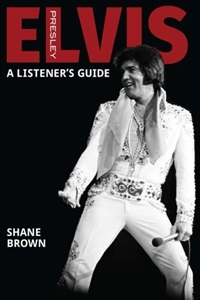 |
EIN Website content © Copyright the Elvis Information Network.
Elvis Presley, Elvis and Graceland are trademarks of Elvis Presley Enterprises.
The Elvis Information Network has been running since 1986 and is an EPE officially recognised Elvis fan club.
|





